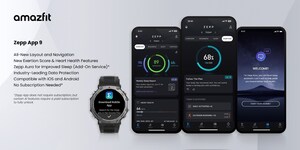Zepp Global Sleep Study Reveals Popularity of Beethoven's Moonlight Sonata at Bedtime; Launches Personalized Digital Lullaby Generator
- Zepp partners with World Sleep Society to understand perceptions around sleep quality in the UK, US, Italy, Spain, Germany and Thailand
- Some poll respondents believe they are losing up to 4.5 hours of sleep worrying about the pandemic
- 60% of respondents who have worn wearables to bed said it made them aware of their lack of sleep
SHENZHEN, China, Nov. 20, 2020 /PRNewswire/ -- Zepp, a professional-grade wearable brand empowering the digital management of personal well-being, today released a Global Sleep Study featuring commentary from the World Sleep Society, an international authority in sleep health. In October 2020, Zepp commissioned an independent poll of 12,000 respondents across 6 countries to understand the concerns, perceptions and attitudes around sleep quality in these unprecedented times.
The results show that feelings of sleep deprivation are more prevalent than most believe and that there is a general yearning for more shut-eye time. The day's worries are deemed to carry on into the night, resulting in less than optimal sleep, and it appears to be a vicious cycle, impacting well-being the next day. With changing lifestyle habits due to the stay-at-home economy brought about by the pandemic, naturally, sleep habits have changed too. Music and meditative habits seem to resonate with respondents of this poll.
Pandemic and Other Anxieties
Thailand was revealed as the nation that was most sleep deprived, with half of respondents (50%) claiming they were definitely sleep deprived, followed by Germany (38%), USA (37.8%), UK (37.4%) Italy (18.5%) and Spain (18.2%). 43% of respondents attributed the problem to work woes, 40% to money worries, and 23% to pandemic-related concerns.
COVID-19 lockdowns were also deemed to have changed people's sleeping patterns, with more than a third (33.6%) of respondents saying they go to bed later than usual, and 20% saying they find it harder to sleep. Respondents believe they are losing an average of 2.7 hours of sleep per night due to pandemic-induced worries, with respondents in Thailand clocking the highest average loss of 4.5 hours per night.
Almost half of respondents in the US (46%) and Spain (47%) feel that they live in a sleep-deprived nation due to technology and social media. Thailand respondents (52%) believe it results from having too much to think about and Italians agree (48%). Respondents in Germany (46%) think it is because they work too hard and are burnt out and those in the UK (46%) say it is because the world is a worrying place right now.
Coping in a Post-Pandemic World
People are also actively taking measures to help themselves sleep better in this time. Top measures include listening to relaxing music, avoiding caffeine in the evening, reading before bed and meditation. 60% of respondents who have worn wearables to bed say it makes them aware of their lack of sleep. Data from wearables are believed to have helped respondents work out the exact number of hours of sleep they have, and improve their sleeping patterns.
"By tracking sleep, you will have a better understanding of if you are achieving the three components of healthy sleep—duration, or the length of sleep, continuity, meaning sleeping without fragmentation, and depth, which is sleep deep enough to be restorative," said Dr. Lourdes DelRosso, Co-chair of World Sleep Day, World Sleep Society.
Music as a Bedside Aid
89% of respondents agreed that listening to calming music can help with sleep. Poll results show Beethoven's Moonlight Sonata was the most popular track for all nations to listen to at bedtime, with the exception of Italy, with respondents favoring Chopin's Nocturne No.2. Respondents in Germany and Thailand said their favorite music genre to listen to was pop, whereas respondents in the US, UK, Spain and Italy said it was classical music.
Personalized Lullabies for an Enhanced Night's Rest
Recognizing music's role in helping people fall asleep, Zepp has worked with Swedish creative masterminds to launch a digital Lullaby Generator.
The free-to-use Lullaby Generator will help users create tailor-made music based on their very own sleep patterns for an enhanced night's rest. Existing Zepp users can login to share their sleep metrics and automatically produce a unique and personalized lullaby. Non-Zepp users can also participate by answering a series of questions about their sleep habits.
As a champion for personal wellbeing, products and programs from Zepp are aimed at helping consumers track their sleep as they embark on their journey towards healthier sleep.
To generate your personalized lullaby, visit https://zepplullaby.com/.
Sleep Tracking Features of Zepp Smartwatches
In August, Zepp launched a stylish line-up of wearables designed with wellness in mind. The all-new Zepp E series leverages the power of artificial intelligence (AI) and cutting-edge technology to convert vital health statistics into actionable insights that help users effectively monitor their physical and mental wellbeing.
Equipped with robust sleep tracking technologies and features, Zepp smartwatches are set to become consumers' best sleeping companion. State of the art sleep tracking measures users' sleep status, including light sleep, deep sleep, Rapid Eye Movement (REM)[1] and awake time, even monitoring 20-minute daytime naps[2] during the day, providing users with overall sleep scores to help them measure the quality of their sleep and breathing.
For detailed product specifications and more information, visit www.zepp.com.
To view the Global Sleep Study Executive Summary and for more materials, visit this link.
The Newest Products from Zepp
In August, Zepp Launched Zepp E Square and Zepp E Circle as its newest product in the line, featured 3D curved bezel-less design and stylish. On Nov. 17th, the premium designed line-up, Zepp Z was released as a premium partner in wellness, equipped with RISC-V wearable chip and PAI™ Health Assessment System[3].
About Zepp
As a professional-grade brand for the digital management of users' well-being, Zepp leverages its leading AI algorithmic system to bring digital health solutions to people around the globe. From traditional health and exercise monitoring to analysis and early health-status warnings, Zepp is committed to helping users improve their quality of life. Zepp believes in the use of technology to better manage our well-being and help everyone enjoy a more fulfilling life. Therefore, Zepp's mission is to "continuously develop new technologies and use accurate data-analysis capabilities to help people manage their own health."
[1] To monitor your REM cycle, the sleep assistant mode, and heart rate tracking must be enabled. The rapid eye movement phase is the sleep phase related to dreams in the sleep cycle. |
[2] The rapid eye movement period, also known as REM, is the basis for the normal biological rhythm and life-sustaining of mammals. It accounts for about 20%-25% of the entire night's sleep cycle. It is characterized by rapid eye movement, low-amplitude mixed-frequency EEG activity, and muscle tension relaxation. To monitor your REM cycle, the sleep assistant mode and heart rate tracking must be enabled. Sleep monitoring: can record evening sleep and naps. When it detects that the wearer is asleep between midnight and 6AM, the sleep time between 6PM of the previous day and 11AM can be recorded as night sleep time; sleep between 11AM and 6PM lasting more than 20 minutes is recorded as a nap. Sleep lasting less than 20 minutes is not recorded. Less than 20-minute naps during the day will not be recorded. |
[3] The HUNT Fitness Study indicates that people who maintain a PAI™ score of 100 or higher show lower risk of hypertension, heart disease, and type-2 diabetes. HUNT Fitness Study: This study was conducted by Professor Ulrik Wisloff of the Faculty of Medicine, Norwegian University of Science and Technology. It lasted for more than 35 years and involved 230,000 participants. |
SOURCE Zepp

Related Links
WANT YOUR COMPANY'S NEWS FEATURED ON PRNEWSWIRE.COM?
Newsrooms &
Influencers
Digital Media
Outlets
Journalists
Opted In





Share this article